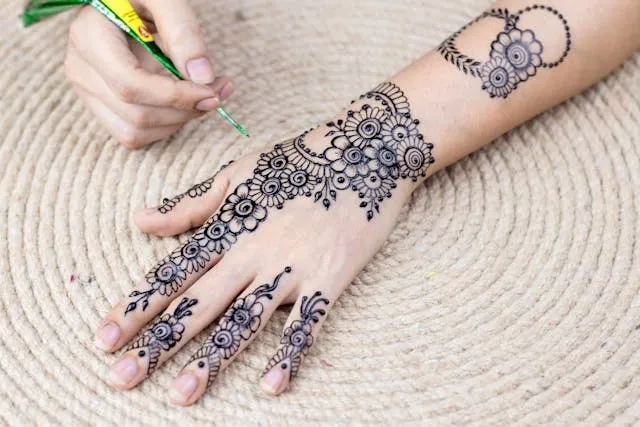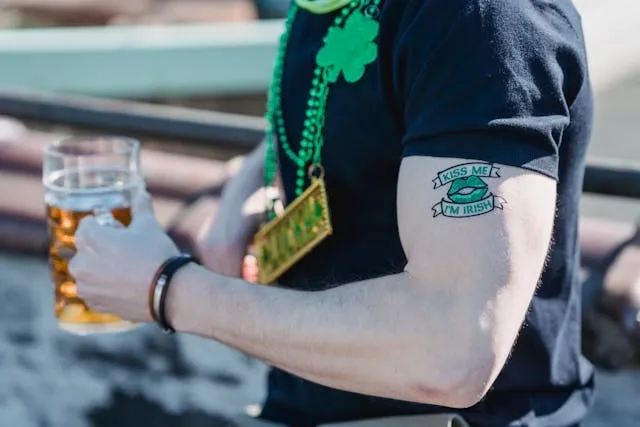Are Temporary Tattoos Safe? Tips For Kids, Sensitive Skin, And FDA Warnings
Temporary tattoos are everywhere today, from party favors to children’s sticker sheets. They are fun, versatile, and free from the lifelong commitment of permanent tattoo, but are temporary tattoos safe to use in all cases?
In this guide, we look at potential risks, things to avoid, and safer alternatives to allow you to enjoy body art responsibly. Knowledge and awareness can make a big difference to your safety.

Key Takeaways
- Temporary tattoos generally carry low risk, but it is wise to be cautious. The safety of temporary tattoos depends on ingredients, design type, and your skin.
- Cosmetic-grade inks are safer, while cheap or counterfeit options are more likely to be toxic. Temporary tattoos are not FDA approved.
- Temporary tattoos are not recommended for pregnant women or babies. Possible reactions range from mild redness to rare chemical burns.
- We supply high-quality, tested temporary tattoos that are non-toxic and safe for use on most skin types. Work with us to create your own designs.
Table of contents
-
Are Temporary Tattoos Safe?
-
Are Temporary Tattoo Kits Safe?
-
Are Temporary Tattoos Safe For Kids And Sensitive Skin?
-
Are Temporary Tattoos Safe For Toddlers And Babies?
-
Are Temporary Tattoos Toxic Or Harmful To Skin?
-
What Kind Of Ink Is Used For Temporary Tattoos?
-
What Ingredients In Temporary Tattoos Should I Avoid?
-
Are Temporary Tattoos FDA Approved?
-
What Are The Risks Of Temporary Tattoos?
-
Are Temporary Tattoos Safe For Pregnant Women?
-
Are There Eco-Friendly Temporary Tattoos?
Are Temporary Tattoos Safe?
The question of whether temporary tattoos are safe often arises because they interact directly with skin. These tattoos are sold as harmless fun, but some people report skin irritation. One key thing to note is that there are differences between different types, including:
- Sticker tattoos
- Henna
- Semi-permanent tattoos
- Airbrush versions
Fake tattoos made with cosmetic-grade materials are usually safe, but cheaper versions may include unsafe colorants. Sensitive skin types are more vulnerable, and fake tattoos can be bad for your skin when ingredients are unclear.
Semi-permanent tattoos can last between 1 and 3 weeks, raising questions about skin absorption. Meanwhile, there are concerns for many about the contents of novelty choices like custom glitter tattoos. Most products don't pose serious risks, but mild reactions like itching or redness can happen
Safe use depends on choosing reputable brands, avoiding toxic inks, and being mindful about vulnerable skin groups, particularly children.

Are Temporary Tattoo Kits Safe?
DIY kits are widely sold in stores and online, but are temporary tattoos toxic in these sets? The answer depends on regulation and transparency. A study indicated that unregulated products may be unsafe or ineffective, so it is important to verify the source of these kits.
Many reputable kits list cosmetic-grade ingredients that are safe for temporary skin contact. However, unregulated products or those without clear labeling could be a risk. They may contain dyes that are not intended for skin, such as:
- Azo compounds
- Paraphenylenediamine (PPD)
Some kits use adhesives similar to glue, which can irritate delicate skin. While many people enjoy these products without issue, those with allergies or eczema should be cautious. Read reviews, check ingredient lists, and buy from reputable sellers.
Choosing high-quality kits ensures that creativity and fun doesn’t compromise skin safety.
|
Tattoo Type |
Duration |
Common Ingredients / Materials |
Potential Risks |
Best For |
Avoid If… |
|
Sticker Tattoos |
1–3 days |
Cosmetic-grade inks, adhesives (like water transfer glue) |
Mild skin irritation from adhesives |
Kids’ parties, events, short-term fun |
Sensitive skin, eczema |
|
Henna (Natural) |
1–2 |
Plant-based henna dye |
Mild irritation (rare if pure); staining clothes |
Festivals, cultural events, adults/teens |
Under 6 years old, pregnant women (skin more sensitive) |
|
Black Henna |
1–3 |
Often contains PPD (paraphenylenediamine) |
High risk of allergic reactions, chemical burns, scarring |
Never recommended |
Everyone (especially kids/pregnant women) |
|
Semi-Permanent (Inkbox, etc.) |
1–3 |
Plant-based staining ink, cosmetic-grade adhesives |
Itching, mild redness possible |
Adults & teens wanting longer wear |
Very sensitive skin, babies |
|
Airbrush Tattoos |
2–7 |
Cosmetic-grade body paints, medical-grade adhesives |
Rare irritation if hypoallergenic paints used |
Festivals, large events, sports fans |
People with asthma if sprays are inhaled |
Looking for safe, reliable temporary tattoos?
Work with us to create your own custom popular tattoos and enjoy safe, personalized designs to add to skin.
Are Temporary Tattoos Safe For Kids And Sensitive Skin?
Sometimes temporary tattoos are safe for kids, and sometimes they aren’t. Children’s skin is thinner and more reactive, so there is a greater risk of things like redness, bumps, or rashes. Kids with eczema or sensitive skin are particularly at risk.
If you are exploring how to choose the best promotional products for business, look for tattoos that are proven safe for skin. Products that seem harmless can still contain adhesives that irritate. Many kids enjoy metallic sticker tattoos and similar products without issue, but patch testing first is an important step.
Here’s how:
- Place a small piece on the arm
- Wait 24 hours
- Check for reactions
Reputable, skin-tested brands reduce risk, but reactions are still a possibility. Parents should supervise use and avoid unregulated products. Safe enjoyment is possible, but thoughtful caution ensures temporary fun doesn’t lead to discomfort.
Are Temporary Tattoos Safe For Toddlers And Babies?
Dermatologists generally discourage applying any form of fake tattoo to babies. The concern about whether temporary tattoos are safe for babies is critical because infant skin is thinner and highly sensitive.
According to research, babies have thinner skin layers and underdeveloped barrier function. This makes them more vulnerable to irritation or even systemic absorption of chemicals. Adhesives or dyes used in temporary tattoos may cause issues like:
- Rashes
- Allergic responses
- More serious reactions
Alternatives like face paints specifically labeled safe for children, or custom circle stickers that adhere to clothing, are better choices for infants. Toddlers may enjoy washable designs that wipe away with water.
Until a child’s skin matures, avoiding chemical-based tattoos is safest.
Enjoy custom glow-in-the-dark tattoos
Our custom glow-in-the-dark tattoos are safe to use and bring a thrilling green glow effect for your parties or events.
Learn moreAre Temporary Tattoos Toxic Or Harmful To Skin?
While small, single-use tattoos rarely cause severe side effects, there are some toxicity risks. Some products use cosmetic-grade, safe dyes, but there are some that use industrial colorants that aren’t supposed to touch the skin.
Harm often stems from unregulated manufacturing, where toxic compounds like lead or PPD may be present. These substances are risks for triggering things like:
- Allergic reactions
- Rashes
- Chemical burns
Fortunately, most reputable tattoos are not toxic, though there is still a risk that they might irritate sensitive users. It’s important to buy from trusted sources and avoid black henna, which is notorious for containing unsafe chemicals.
When you order custom metallic tattoos and other variants from our service, you can rest assured everything is safely manufactured and regulated. Choose responsibly to help protect skin from avoidable harm or irritation.
What Kind Of Ink Is Used For Temporary Tattoos?
Temporary tattoos use a wide range of inks and adhesives. Safer versions use cosmetic-grade dyes, specifically tested for skin contact. These inks are similar to those in make-up and are generally well-tolerated on human skin.
Products like Inkbox use skin-safe, plant-based formulas that stain only the outer skin layer. However, cheaper tattoos may cut costs by using industrial-grade pigments not designed for skin. Adhesives also vary, with options including:
- Medical-grade glues
- Harsher alternatives
Quality control differs depending on the brand and country of origin. The safest tattoos clearly list cosmetic-grade colorants and FDA-permitted adhesives. Assessing the ink in temporary tattoos is different from investigating that in the best gel pens, because it is imperative that it is safe for skin contact.

Need something that lasts a little longer?
Use our online service to create custom semi-permanent tattoos with personalized designs for long-lasting applications.
What Ingredients In Temporary Tattoos Should I Avoid?
Not all temporary tattoos are harmless. Some contain ingredients that can irritate or harm skin. You need to look out for things like paraphenylenediamine (PPD), often found in black henna, which is known to cause burns and scarring.
Other harmful dyes include:
- Lead
- Low-grade adhesives
- Azo dyes
Researchers have found that azo dyes can be reduced by skin bacteria into carcinogenic aromatic amines, which could do serious harm. Other possible reactions include anything from mild redness to severe rashes.
The question of whether temporary tattoos are toxic often arises because of these unsafe formulations. To avoid risks, always check packaging. Safe tattoos use cosmetic-grade inks and fragrance-free adhesives. Avoid products with unlabeled or vague ingredient lists.
Choosing eco-friendly or plant-based options reduces risk further. Educated choices are important to protect skin and ensure temporary tattoos remain fun without long-term consequences.
Are Temporary Tattoos FDA Approved?
Concerns around FDA approval for temporary tattoos persist, and the answer is nuanced. The FDA regulates cosmetic products, but most temporary tattoos are not individually tested or formally approved before sale. What’s more, experts say FDA approval does not guarantee that a product is completely safe.
Certain dyes used in cosmetics are permitted for skin application. But there are tattoo manufacturers that use unapproved or unlisted colorants. This regulatory gap explains why reactions sometimes occur.
Consumers must take responsibility for choosing safe products from reputable sources. FDA warnings have been used against unsafe tattoos - particularly black henna. While FDA approval isn’t standard for temporary tattoos, buying from brands that voluntarily test their products helps.
Until broader oversight exists, consumers should remain vigilant. Safe practice means patch testing, reading labels, and avoiding tattoos with unclear origins.
Choose a glistening, colorful option
Let us bring your vision to life in custom rainbow glitter tattoos that are safe to apply and maintain their shine.
Get startedWhat Are The Risks Of Temporary Tattoos?
The risks of temporary tattoos vary depending on skin type, product quality, and ingredients. Mild reactions include itching, redness, or bumps. More serious problems can involve things like:
- Allergic reactions
- Chemical burns
- Scarring
Black henna is particularly notorious for containing unsafe dyes. For most users, the risks are minor, but they become higher for people with eczema or sensitive skin, or for young children. Many ask whether fake tattoos are bad for your skin, and the answer is that they are usually fine if they are high-quality and cosmetic-grade.
The general advice is for consumers to be cautious, as even mild irritation can cause discomfort. Risks are greatest when using unregulated products or applying tattoos to already irritated skin.
If you want a safe alternative that still allows self-expression, consider creating custom printed patches to wear on your apparel, keeping your skin protected.
Can Chemical Burns Happen From Temporary Tattoos?
Though rare, chemical burns from temporary tattoos have happened, most commonly from black henna. These products often contain PPD, a chemical that can penetrate skin and cause severe irritation.
Symptoms of chemical burns include:
- Blistering
- Redness
- Swelling
- Long-lasting scars
This explains why the question of whether temporary tattoos cause cancer or permanent damage sometimes arises. While there’s no evidence linking them to cancer, research shows that contact with azo dyes is linked to eczema and allergic reactions, and PPD can cause real harm.
If burns occur, immediate medical attention is strongly recommended. Safe alternatives use cosmetic-grade inks that are free of PPD. Consumers should avoid black henna tattoos altogether, especially at unregulated vendors like fairs or markets.
Prevention through cautious product selection is often the best defense against painful, unnecessary chemical burns.
Are Temporary Tattoos Safe For Pregnant Women?
Pregnant women often wonder about the safety of temporary tattoos during pregnancy. Pregnancy increases skin sensitivity and the risk of allergic reactions goes up. Hormonal changes may make even normally safe products irritating.
While cosmetic-grade temporary tattoos likely won’t cause systemic harm, the lack of comprehensive testing is a reason to be cautious. Evidence is limited, but there is a chance that certain chemicals in adhesives or dyes could pose a threat to:
- Mother
- Baby
Most experts recommend avoiding any kind of chemical-based tattoos while pregnant to minimize risks. Ultimately, while there’s no strong evidence of danger, it might be best to stick to safer alternatives like eco-friendly, plant-based tattoos or decorative stickers.
Pregnant women should prioritize safety, and custom waterless tattoos and other varieties will be waiting for you after you have given birth.

Are There Eco-Friendly Temporary Tattoos?
There are such things as eco-friendly temporary tattoos, and they are becoming increasingly popular. There are many benefits of using eco-friendly promotional products, and these temporary tattoos are made with things like:
- Biodegradable materials
- Plant-based inks
- Adhesives free of harsh chemicals
They reduce environmental impact and minimize health risks associated with untested dyes. Eco-friendly tattoos often come from companies dedicated to sustainability, ensuring safer choices for both skin and planet.
Parents who ask whether fake tattoos are safe for kids may find eco-friendly brands reassuring. Plant-based inks mimic the look of standard tattoos without relying on toxic compounds. While eco options may cost more, the trade off is worth it for safety and sustainability.
Choose eco-conscious tattoos to support greener choices while enjoying stylish, temporary designs.
Frequently Asked Questions About Are Temporary Tattoos Safe
Are Temporary Tattoos Safe Or Not?
When sourced from reputable, cosmetic-grade brands, temporary tattoos are safe for most users. However, unsafe ingredients in unregulated products may cause irritation, allergies, and even burns.
Can Temporary Tattoos Cause Skin Irritation Or Allergic Reactions?
Mild irritation is possible, particularly in people with sensitive skin or eczema. Common signs include redness, itching, or rashes. Aim to choose skin-friendly, tested products to reduce risks.